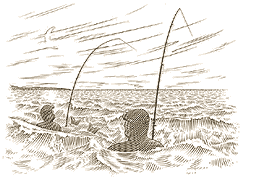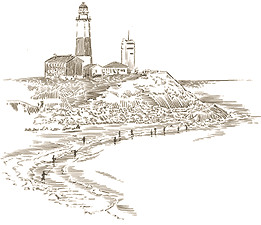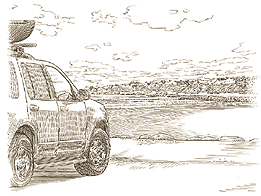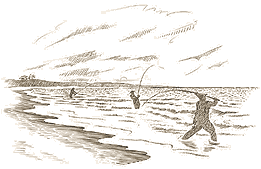
 | |
 |
|
 | |
 | |
 | |
 | |
 | |
|
Chapter I SWIMMING WITH THE FISHES "I don't advise peeing in your wetsuit," shouted Paul Melnyk. "You'll get a mean rash." "I'll keep that in mind," I hollered into the wind, my words quickly blown back into my face. Truth was, whizzing in my neoprene bodysuit was the least of my worries. I was standing at the edge of the roiling Atlantic in Montauk, New York. Clouds covered the sliver of a moon, the chilly October night as black as the bottom of a well. In a few minutes I would follow Melnyk into the ocean. We planned to lie on our backs, fishing rods held under our arms, and kick our way 300 hundred yards offshore. Once there, we would float on the current that ran parallel to the beach, casting live eels for striped bass. After we were carried for a half-mile or so, we would kick back to where we started and begin the drift again. Melnyk, a Montauk local who invented this form of angling, calls it skishing (a cross between skiing and fishing, since large stripers often towed him like a water-skier). As one guide told me before my skishing adventure, Melnyk was on "the extreme end of extreme." The night before our trip, a surf fisherman, with both feet on shore, had landed a 50-pound striper, and Melnyk wanted to best that mark. He was sure the fish was an indication of a school of trophy striped bass in the area. There was no turning back. We huddled behind a large dune to zip our wetsuits and run through an equipment check. Headlamp? Check. Whistle? Check. Pliers? Check. Knife? Check. "If a shark grabs me, I expect you to fight him off with your knife," said Melnyk, trying to loosen up the situation. His levity was lost on me. I knew enough about the area to realize that the threat of sharks was no joke. Just more than a decade back, a Montauk charter boat had landed a monstrous great white (17 feet, 3,427 pounds) that had been snacking on a dead whale not far from the point, and just that summer a 14-foot mako had been pilfering stripers from the ends of fishermen's lines and ramming boats near Cape Cod. Up and down the East Coast, 2001 had been the summer of the shark. There were also rip currents, some of which ran at 8 knots. If we got caught in the wrong place, we would be shot out into the ocean as if on a water-park ride. "Let's do this before I chicken out," I said. "Okay. Remember, this is a shore break. It's dangerous surf. These waves can pick you up and slam you on the beach. It'll ruin your week. Once we clear them it's easy sailing - make that kicking." We waded in. The surf zone was a cauldron of whitewater, and beyond it the sea's lumps melded with the sky. When the water reached our knees, we dropped on our rumps and pulled on our flippers. With the waves rushing to shore, it was a clumsy endeavor, and twice I rolled face first into the water before succeeding. "Ready?" yelled Melnyk. "Ready." "Kick, kick, kick, kick." When my flippers gained purchase, I zipped ahead into the wash. "Stay with me, Dave." We were kicking side by side when the first breaker rushed over us. I swallowed a mouthful of seawater and bobbed to the surface. Melnyk hooted with delight. The next wave lifted me up and carried me tumbling back where I'd started. "Come on, Dave. Kick, kick, kick!" coaxed Melnyk. I gathered myself and pushed off again. In less than 30 seconds we were out of the surf, rising and falling on the choppy waves of the ocean. At 54 degrees, the water breaching our wetsuits was breath-stealing. "Is this living or what?" screamed Melnyk. "We're on the edge, man." "How much further?" "About 100 kicks." On the crest of each wave I could see the shore. TV sets were flashing muted blues and reds in the windows of the beach motels above the dunes. I found myself envious of the occupants, who had little fear of disappearing into the Atlantic. Suddenly there was a surface commotion just in front of our heads, like a broom slapping the water. "Just a flock of sea ducks riding out the weather," said Melnyk. "We probably scared the shit out of them." "Likewise." Eventually Melnyk yelled, "We're here, man." We stopped kicking. The thick wetsuits provided enough buoyancy to keep us chest high in the gin-clear water. I flipped my headlamp on; it illuminated a circle in front of me, the strobe reaching toward the bottom. I could see my purple flippers flexing as I flutter-kicked to stabilize myself. I wondered what could see me from below, and inched closer to Melnyk. Melnyk kept each eel in an individual sandwich-sized Ziploc bag for easy handling. He passed one to me. It squirmed within its plastic confines as I hooked it through the jaw. With the hook in place I pulled hard, ripping the bag and freeing the eel. It danced on the end of my line. If I didn't cast soon, it would tie itself and the line into a slimy knot. I turned my light off. Melnyk already had his eel in the water. He was floating about ten feet from me. His black neoprene hood combined with his surf rod rising from the surface made him look like a seagoing knight, his trusty steed a sea creature from Proteus's flock. As I went to cast, Melnyk's rod quivered, then bent deeply. He reared back on the fish, then yelled, "Oh baby, they're here." In 1954, the editors of Salt Water Sportsman declared that the striped bass had "a fanatical human following that compares to none." If Paul Melnyk is any indication, the striped-bass fervor is now stronger half a century later. It's estimated that on the East Coast nearly three million fishermen pursue the fish. Feeding the passion is a striper population that has soared to an estimated 150-year high after experiencing a near total collapse in the early '80s. The reasons for the decline were legion - from over harvesting to pollution of the spawning grounds - but thankfully legislation and the resiliency of the striper helped reverse the damage. The stock resurgence was in full swing when I joined the striper faithful in 1995 not long after I moved to New York City to begin my career as a journalist. Having grown up on the banks of a coastal river outside Savannah, Georgia, fishing was as much a part of my character as my southern accent. I spent the days of my youth immersed in the pursuit of fish. The walls of my room teemed with photos of sea life clipped from sporting magazines: Sailfish herded bait with their electric-blue dorsal fins, giant bluefin tuna rose from the depths, redfish tails wagged above the surface. On the ceiling above my bed, next to a shark jaw suspended on a piece of fishing line, I tacked a chart of the local waters. I liked to study it before I went to sleep. One night my father opened my bedroom door. He inquired about my homework, then took a good look around. "You know, Dave," he said, "at this age your brothers had posters of women on the walls." Instead of fast-food joints or lifeguard stands, I found work on the decks of private and charter fishing boats. Every time I sank the gaff in an especially green or wildly thrashing fish aboard the Captain D, a thirty-foot charter boat, my boss would turn to our party and say, with pride, "That, folks, is a sign of a misspent youth." When it came time to choose between two colleges I wanted to attend in New England, I opted for the school surrounded by the best trout water. In New York, I took fish where I could find them. On weekends, I fly-fished in one of Central Park's weed-choked ponds for stunted largemouth bass, and once foul-hooked a baby stroller on my backcast. Fortunately, the stroller's occupant was on a nearby blanket. While navigating around the city, I frequently took detours through Chinatown to look at the blackfish that swam in crowded tanks before being sold to passersby for chowder or whole roasting. In Midtown, I stared through the windows of high-class seafood restaurants at the dead fish - snapper, grouper, monkfish, salmon, rainbow trout - laid out on beds of ice. There were also countless trips to the Coney Island Aquarium. These routines did not placate my needs, only exacerbated them. Then, on a foggy night in Long Island Sound, I landed my first striper. It weighed 20 pounds and was just over 36 inches. That a fish of such size could be swimming in the shadows of New York City's skyline in a waterway I thought corrupt with pollution amazed me. I was, to borrow a term from the writer Charles Gaines, "gut-hooked." Striped bass had not been part of my angling education, but I soon learned that the fish migrated from warmer climes to the waters surrounding the city in the spring and left in late fall. Their catholic appetite made them suckers for an array of lures and baits. Best of all, I discovered, I lived literally a New York minute from prime fishing grounds: the Hudson River. Often I would wake when many of my friends were returning from a night on the town, walk three long blocks from my apartment - across Broadway, West End Avenue, and Riverside Drive - to the Hudson, and land a handful of fish before work. I was usually alone, save for the brown blur of rats returning to their riverside lairs and bums sleeping off hangovers on park benches. It was during these sunrise expeditions that I began formulating the ultimate angling adventure. For years I kept the plot to myself, carrying it around like a lucky rock. When the absurdities of life reared up, I retreated to my plan, honing details, knowing one day I would need to execute it. I wanted to follow the fall migration of this grand fish, for fall is the best time to be a striper fisherman. With the task of their southward movement burning up energy and the need to store fat for the approaching winter, stripers seem to do nothing but eat. It is a movable feast. And they're never far from shore. During my first fall in Montauk, I had watched this river of feeding fish pass by after a few weeks of inconceivable action. Perched on a rock in the surf, I had looked out on an ocean that was awash with life - stripers, bait, birds - and watched it go blank. Not a temporary blip but a blackout. On the stripers' tails, a northwest wind, cold and stiff, blew like stink for three days. There would be stragglers, but the giant game convoy had vanished, or so it seemed. Really, it has just moved farther south, to the delight of other anglers awaiting its arrival. My journey would begin in Bath, Maine, near the northern end of the stripers' range. There I hoped to find the fish on the cusp of their fall migration. When they headed south, so would I. My path would intersect with the grand locales of striper fishing: the Kennebec River, Nauset Beach, Martha's Vineyard, Cuttyhunk, Jamestown, Montauk, Cape Charles, Oregon Inlet. I'd finally tap the brakes for good, some three months after I set out, on the Outer Banks of North Carolina. Here the striped bass spend the winter. I would pursue the fish in the surf, from all types of boats, and even underwater with my camera. In doing so, I'd spend time in the company of the country's finest sharpies, as the best striper fishermen are called. If my timing was decent, I would keep pace with the convoy of fish. With the trinket shops of summer-vacation towns shuttered and traffic jams replaced by leaves loping along grassy shoulders, the road would be mine. At night, when I wasn't fishing, I'd camp, bunk with friends, or crash in cheap seaside motels. For some time the realities of my scheme, though assuaging, seemed insurmountable. But my obsession with the striped bass eventually wore them down. Seven years after landing that first striper in Long Island Sound, I hucked my job, tried desperately to explain the situation to my girlfriend, found a vehicle, and cemented an itinerary. I told my bewildered friends I had become a striper groupie. With the fish hooked, Melnyk leaned back for leverage, as if sitting in a submerged Barcalounger, his flippers poking above the surface, and went to work. He whipped the striper in less than five minutes and then grabbed the leader, steering the 20-pound, three-foot-long fish under his arm. A big striper, but not the cow he was hunting. "This one's as docile as a baby," he said, reaching for the hook. Unfortunately, the sea wasn't as calm. A large wave, its breaking crest alerting us it was on its way, lifted us skyward. For a second atop the six-footer, a gust of wind smacked us like a balled-up wet towel. "Whoa, who turned on the fan?" said Melnyk. Then we dropped down the backside of the wave. The heavy weather had me spooked, and it was only going to get rougher. I made a deal with myself: No copping out for at least 30 minutes. A few casts later I felt a solid thump on my line and set the hook. Immediately, the fish began to have its way with me; I plunged face first into the water. I pulled my head out to hear Melnyk laughing but then went down again, my legs kicking like mad. This time I managed to lean back and exert some pressure. The fish charged for the shore, spinning me around and, again, yanking me off of my axis, but I recovered much quicker. Back in position, I began to get towed away from Melnyk. "Hey, don't let me get too far away," I yelled. "Ha! You're doing great. Might be a 30-pounder." After ten minutes I had the fish in close. Then it came thrashing out of the water, its teeth clacking, head swinging back and forth. I was eye to eye with a 10-pound, pissed-off bluefish, one of the ocean's gamest, and dirtiest, fighters. There would be nothing docile about this landing. As the fish circled, I tried to reach out for a neck grab, but every time I did it rose up and tail-walked across the surface, snapping its jaws like a set of hedge clippers. "Watch those chompers!" yelled Melnyk. "Lose a finger out here and we'll have one hell of a chum slick." Finally I got a grip just behind the blue's head and pried the hook free. The catch did little to buoy my courage. For the next 25 minutes, neither of us even registered a hit. "I think we need to go out a little further. Maybe another hundred yards," said Melnyk. "You up for it?" "I think I might want to head in," I said. "I'm a little freaked out tonight." "We can go in if you want. Just say the - Wow, what was that?" His sentence had been interrupted by a deep grunting sound coming from directly beneath us. "I was hoping you would have a good explanation." "Maybe it's a blackfish marking its territory." "Blackfish don't grunt." "Just another one of the wonders of being out here," he said. My wonderment ended a few seconds later when I told Melnyk I'd had enough. "You sure, man?" he said. "Positive." After taking a drumming in the surf on the swim to shore, I stood up in a few feet of water. My legs felt like wet noodles. When Melnyk dropped me off I took a long, hot shower, then went to the Dock, a rowdy bar favored by fishermen, for a double bourbon on the rocks. I'd never been so happy to be on solid ground, oh-so-wonderful solid ground. The foregoing is excerpted from On The Run by David DiBenedetto. All rights reserved. No part of this book may be used or reproduced without written permission from HarperCollins Publishers, 10 East 53rd Street, New York, NY 10022 |